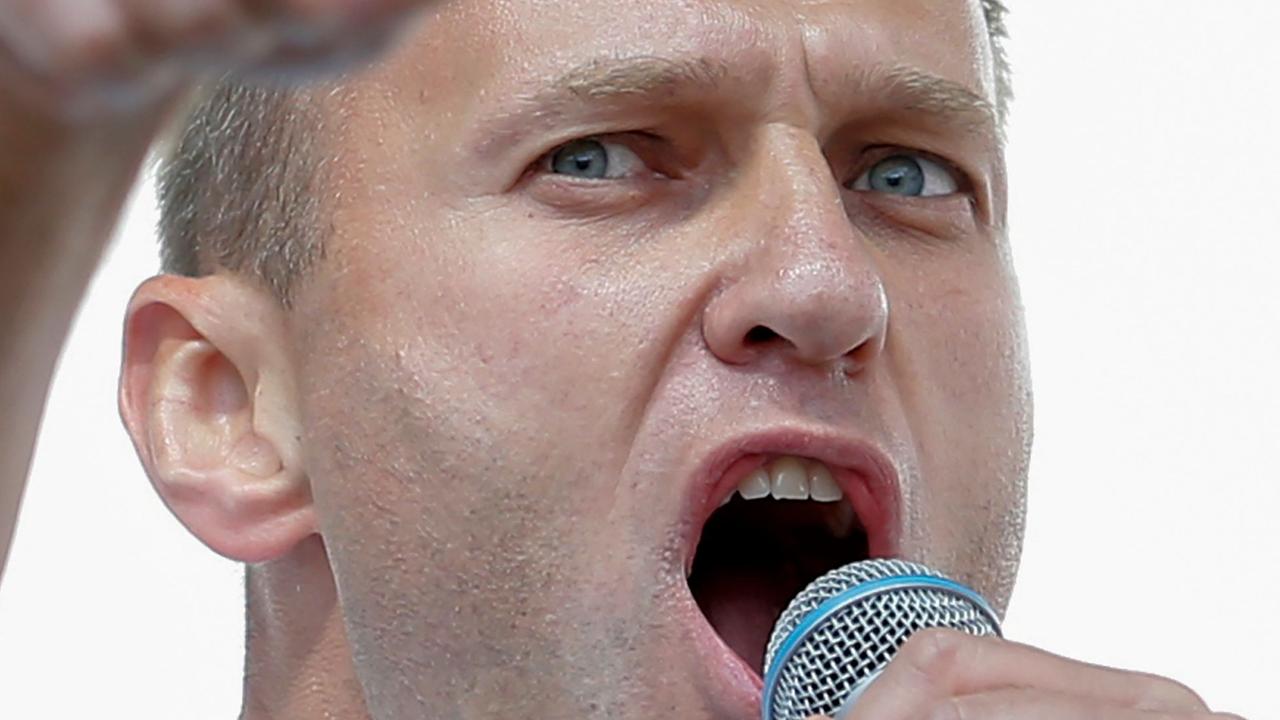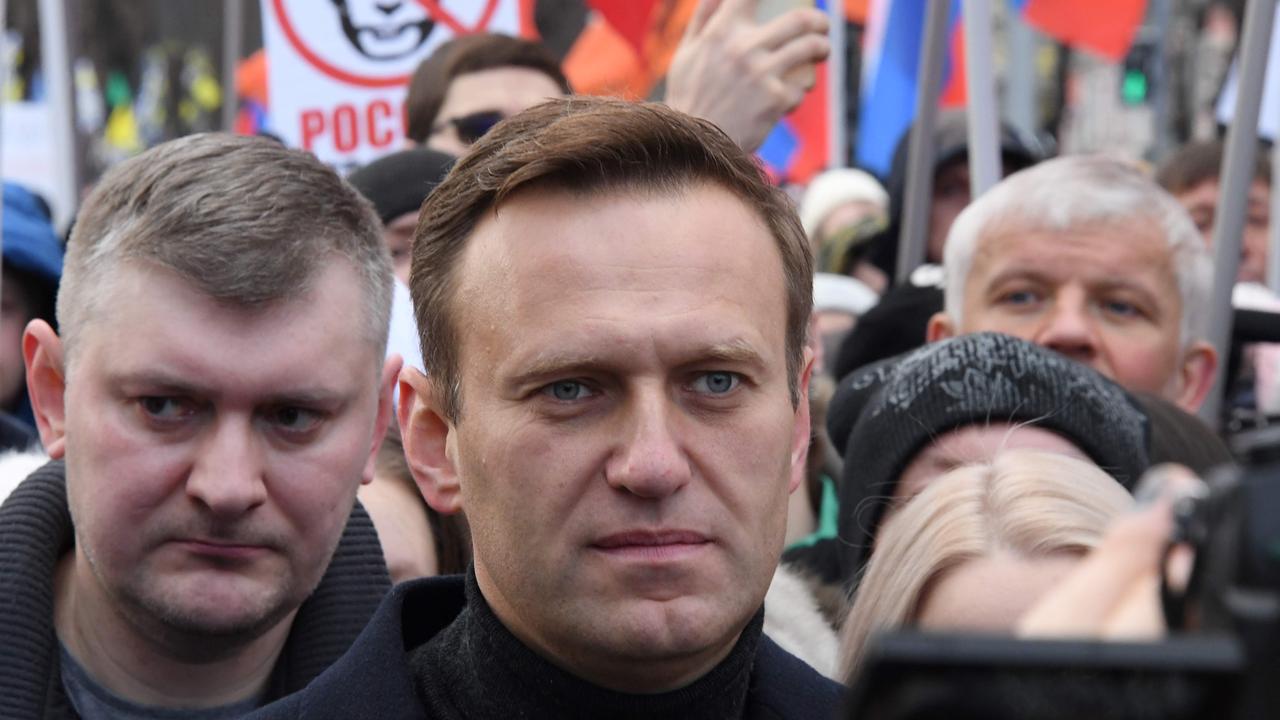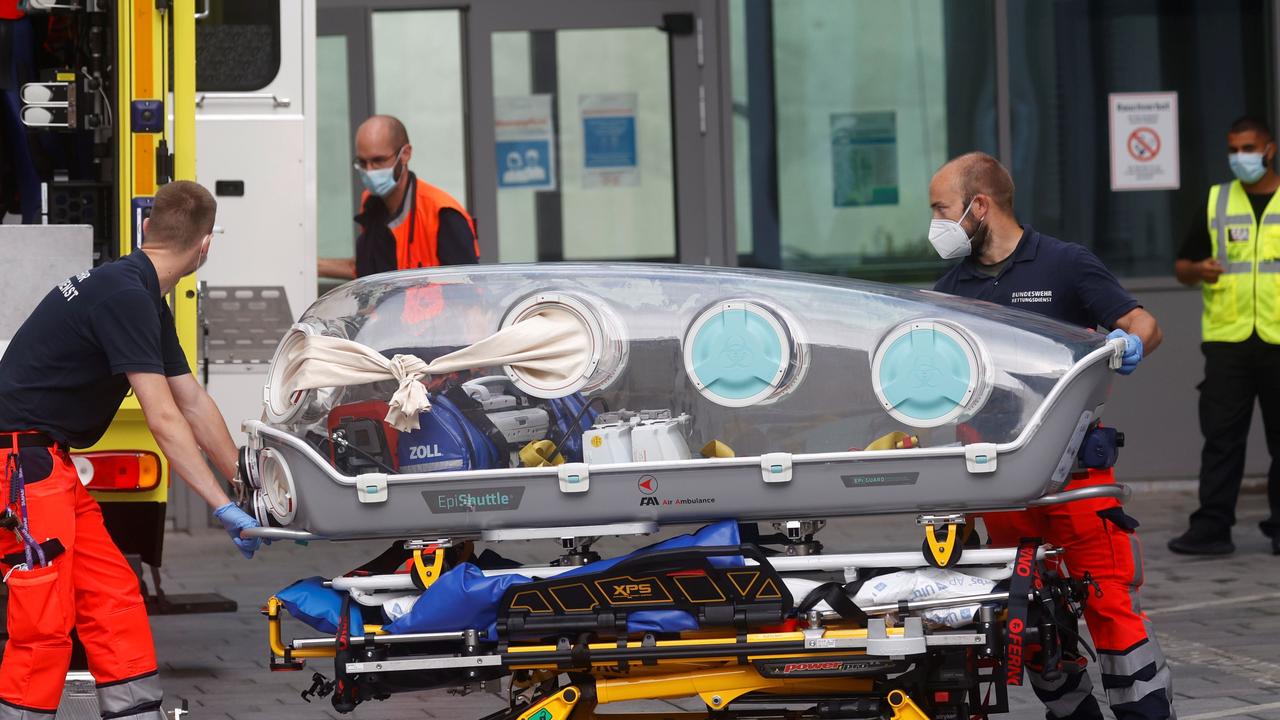Vladimir Putin opponent Alexei Navalny likely poisoned, tests show
Tests on the leader of the Russian opposition to Vladimir Putin have revealed answers, despite doctors insisting he had a metabolic disorder.

The Berlin hospital treating leading Russian opposition figure Alexei Navalny said that test results indicated poisoning, contradicting the finding of Russian doctors.
It comes as the hospital revealed in a statement that Navalny is being treated in intensive care and remains in medically induced coma.
While his condition is serious, the “prognosis remains unclear; the possibility of “long-term effects, particularly those affecting the nervous system, cannot be excluded”.
Despite this, spokesperson Manuela Zingl from renowned Charité hospital said his condition is not currently life-threatening.
The 44-year-old critic of Vladimir Putin and anti-corruption campaigner was brought to the German capital on Saturday after falling ill in Siberia last week with what Russian doctors blamed on a metabolic disorder.
“Clinical findings indicate poisoning with a substance from the group of cholinesterase inhibitors,” Zingl said.
Cholinesterase is an enzyme that is needed for the central nervous system to function properly.
“The effect of the poison – namely, the inhibition of cholinesterase in the body – was confirmed by multiple tests in independent laboratories.”
RELATED: Vladimir Putin opponent Alexei Navalny critical
The specific substance involved in the posoning remains unknown, the hospital said, adding that more “comprehensive testing has been initiated”.
Navalny is being treated with antidote atropine, a prescription medicine reportedly used to treat the symptoms of low heart rate.
“The treating physicians remain in constant contact with Mr. Navalny’s wife,” Zingl said. “After close consultation with the patient’s wife, Charité is reassured that the decision to make details of the patient’s condition public would be in accordance with his wishes.”


Chancellor Angela Merkel’s spokesman Steffen Seibert had told reporters earlier it was “fairly likely” Navalny had been poisoned.
Russia’s most prominent opposition figure was rushed into intensive care in Siberia on Thursday after his plane made an emergency landing in the city of Omsk.
His supporters have said they believe he was poisoned by something in his cup of tea at the airport before he took off, pointing the finger of blame at President Putin.
The Omsk regional health ministry has said that caffeine and alcohol were found in Navalny’s urine, but “no convulsive or synthetic poisons were detected”.
“The suspicion is … that somebody seriously poisoned Mr Navalny which, unfortunately, there are some examples of in recent Russian history, so the world takes this suspicion very seriously,” Seibert said.
🇬🇧1/4 Alexei #Navalny is being treated in intensive care at #charitéberlin and remains in medically induced coma. While his condition is serious, it is not currently life-threatening. Following his admission, Mr. Navalny underwent extensive examination by a team of Charité...
— Charité - Universitätsmedizin Berlin (@ChariteBerlin) August 24, 2020
Врачи немецкой клиники Шарите подтвердили, что Ðавальный был отравлен - вещеÑтвом из группы ингибиторов холинÑÑтеразы. СоÑтоÑние ÐлекÑÐµÑ Ñтабильное, но он по-прежнему в коме. Прогнозов пока нет
— Кира Ярмыш (@Kira_Yarmysh) August 24, 2020
‘PLAY FOR TIME’
Navalny was flown to Berlin on a medical plane chartered by German NGO Cinema for Peace, an initiative financed by private donations.
The transfer came after Ms Merkel extended an offer of treatment in Germany, saying news of Navalny’s condition had “truly upset me”.
The Charite doctors have pledged to carry out an “extensive medical diagnosis”.
Doctors treating him in Omsk initially refused to let Navalny leave but had a change of heart after his family and staff demanded he be allowed to travel to Germany.
Navalny’s spokeswoman Kira Yarmysh claimed Russia’s refusal to evacuate him was a ploy to “play for time” and make it impossible to trace poison.
At a press conference on Monday, doctors in Omsk denied they were pressured by officials while treating Navalny.
“There was no influence on the treatment of the patient a priori and there couldn’t have been any,” said Alexander Murakhovsky, the chief doctor at the Omsk emergency hospital No 1.

‘MANY FACTS MISSING’
Jaka Bizilj, head of the Cinema for Peace NGO, told Germany’s Bild newspaper he believed Navalny would survive but “the crucial question is whether he will survive this unscathed and continue to play his role”.
In any case, he would certainly be out of action politically “for at least one or two months”, Bizilj said, meaning he would miss key regional elections next month.
German Foreign Minister Heiko Maas said that “more clarification is needed” on Navalny’s condition.
“There are still many facts missing, of a medical but also criminological nature, which we must wait for,” he said during a visit to Ukrainian capital Kiev.
Navalny is the latest in a long line of Kremlin critics who have fallen seriously ill or died in apparent poisonings.
He lost consciousness shortly after his plane took off on Thursday from Tomsk in Siberia, where he was working to support opposition candidates ahead of next month’s elections.
Ms Yarmysh said he had seemed “absolutely fine” before boarding the flight and had neither drunk alcohol nor taken any medication.
She said she was sure he had suffered from an “intentional poisoning” and blamed Putin.
Navalny has made many enemies with his anti-corruption investigations, which often reveal the lavish lifestyles of Russia’s elite and attract millions of views online.
European Union leaders including Ms Merkel and French President Emmanuel Macron have voiced concern for him after he faced repeated physical attacks and prosecutions.
The director of the Anti-Corruption Foundation that Navalny founded, Ivan Zhdanov, confirmed on social media that the organisation was continuing its work



